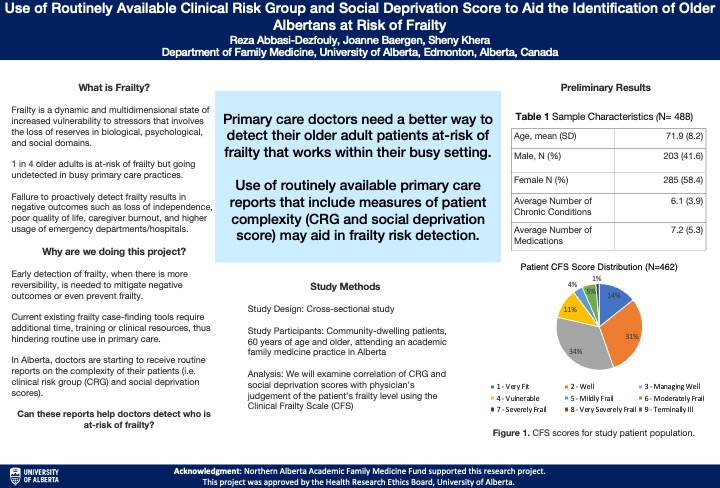PRP097: Use of clinical risk group and social deprivation score to aid the identification of older Albertans at risk of frailty
Sheny Khera, MD; Reza Abbasi Dezfouly
Abstract
Context: 1 in 4 older adults presenting to primary care providers (PCPs) have undetected frailty and will go on to develop functional decline and loss of independence. Integrated primary care models are needed to detect frailty in its earlier stages, when there is more reversibility, to mitigate negative outcomes of frailty, or even prevent frailty. To facilitate this, frailty case-finding tools are needed, however, many require additional time, training, use of specialized equipment, or clinical resources, thus hindering efficiency and consistency in the busy primary care setting. In Alberta, PCPs are starting to receive routine reports on the complexity of their patients (i.e. clinical risk group (CRG) and social deprivation scores) from the Health Quality Council of Alberta. The use of CRG and social deprivation scores to aid early detection of frailty risk has not been formally studied before. Objective: To examine the utility of available administrative data (CRG, and social deprivation score) to aid frailty risk detection. To investigate the correlation of CRG and social deprivation scores with other frailty case-finding tools. Study Design: Cross-sectional study. Setting/Dataset: Data custodians are PCPs who are part of the Canadian Primary Care Sentinel Surveillance Network (CPSCNN), use the MedAccess EMR system, and consent to extract eligible patient chart data. The dataset includes patient demographic data, clinical encounters, chronic conditions, medications, lab results, and frailty case-finding scores (e.g. electronic frailty index, clinical frailty scale, frailty index from the comprehensive geriatric assessment), and administrative data (CRG and social deprivation scores). Population studied: Eligible EMR charts for data extraction include community-dwelling patients, 60 years of age and over, attending an academic family medicine practice in Alberta from 2013-2020. Outcome measures: Descriptive, Pearson correlation coefficients, and regression analysis to examine the relationship between frailty scores, CRG, and social deprivation scores. Anticipated Results: The study will inform on the novel use of routinely available CRG and social deprivation scores to help PCPs efficiently determine which older adults may be at risk of frailty and benefit from further frailty assessment. Further insight will be gained on how the addition of this administrative data may impact the correlation of existing frailty tools.

Diane Harper
harperdi@med.umich.edu 11/21/2021Important topic. I don't see your SDOH measures? only the CRG. Thank you for submitting to NAPCRG